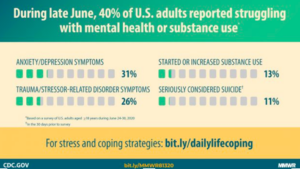
08 Sep Dropping the Stigma for the Silent Strugglers by Sarah Mill
I’m here to stand up for the silent strugglers.
With this year’s National Suicide Prevention Week coinciding with the continued struggle many are facing during the ongoing pandemic, it’s time we take a time-out and talk about mental health. So whether you’re reading this to learn how to better take care of yourself or to better support others to take care of themselves, I applaud you.
The unfortunate truth is that in the fast-paced world we live in, mental health and well-being tend to sit silently in the back seat. We’re so consumed by the constant streams of media and the expectation to be available 24/7 that we forget to check-in with ourselves and others. What’s even worse is that depression and anxiety have been skyrocketing due to the increased pressures, sudden changes, and continued isolation people are experiencing during the pandemic. What might have been manageable symptoms before are now exacerbated by the restrictions and uncertainty brought on by the pandemic.
At the peak of the pandemic, 40.9% of participants in a CDC survey reported struggling with mental health issues or substance abuse. This includes the near 11% who reported having seriously considering taking their own life in the last 30 days. Among the most at risk are young adults, racial/ethnic minority groups, and essential workers.

This is a hard reality to face, pandemic or not. Nearly 1 in 5 adults in the U.S. will suffer from some form of mental illness in their lifetime. Depression impacts over 264 million people all over the world, with adults in the U.S. accounting for nearly 17.3 million of those people. In the worst cases, depression leads to death. My heart sank when I learned suicide ranks as the 10th leading cause for death in the U.S., with an average of 132 suicides per day.
Want to know one of the worst parts? Despite the prevalence of mental illness, depression, and suicide in our country, it remains a highly stigmatized issue. There are so many people who struggle with mental illness, including depression, who silently struggle out of fear of being judged, labeled, or misunderstood. These people might avoid seeking help out of shame. Others don’t know where to go or who to turn to in order to get the help they need.
By continuing to spread awareness and changing the narrative of mental illness, we can change the stigma. I know it’s not fun nor is it easy to talk about mental illness, depression, or suicide but these conversations need to happen. These conversations could save a life.
We need to be aware of this hidden problem.
Depression is hard to deal with, no matter where you are. However, considering the average person spends one-third of their life at work, we need to talk about the implications of depression in the workplace. I’m sure we’ve all jumped to conclusions when someone is having an off day. They’re being lazy. They’re in a bad mood. They simply don’t care. But what if these assumptions were masking our ability to identify someone who is struggling with their mental health.
We need to talk about depression at work.
When someone is struggling with depression, it can impact their ability to be a productive member of a team. From feelings of increased exhaustion and anxiety to decreased confidence and motivation, there are a lot of ways depression can rear its head in the workplace. The unfortunate piece is that many people don’t realize depression is the culprit, leading to assumptions and frustrations rather than offering a helping hand.
Unfortunately, people suffering from depression often avoid drawing attention to their struggles. The results of one Employers’ Health survey revealed that 58 percent of the participants who responded as having been diagnosed with depression at some point in their life did not disclose their diagnosis to their employer.
Why? 49 percent feared their diagnosis would put their job at risk, and 24 percent were afraid of being judged and losing confidence in their abilities at work. Depression is lonely enough, never mind if you feel pressure to hide it. There is a need for more compassion and less stigma around issues of mental health.
The first step in helping is awareness.
It’s common for people to misunderstand and misinterpret the symptoms of those struggling with depression. It’s important to be aware of the signs that just might be masking a bigger problem. Consider the following signs that could indicate a team member who is struggling:
- Isolation and withdrawing from the team: this may indicate they are feeling intense sadness and don’t want to bring others down or be criticized or questioned for their lack of enthusiasm because chances are they don’t fully understand it either.
- Missing deadlines or being a “scatterbrain”: depression can lead to difficulty concentrating and increased brain fog, making it harder to concentrate and get work done.
- Change in appearance: depression can greatly impact someone’s appetite, leading to extreme weight loss in some cases. A grave and hollow appearance might indicate the increased fatigue that results from depression.
- Lack of enthusiasm or increased disinterest: It is not uncommon for people struggling with depression to suddenly lose interest in activities that they once found joy or meaning in. If this change comes on hard and fast, rather than assuming they are being lazy or they don’t care, consider checking in to see if there is something more serious going on.
- Increased absenteeism: in severe cases, people will withdraw themselves from their normal activities and responsibilities. While a personal day here or there is beneficial for mental health, calling in sick on an increased basis might point to a bigger problem.
Once you understand the signs, be proactive with your approach.
I know all too well how quickly feelings of depression can escalate. Don’t wait until it is too late. Foster a culture that promotes general well-being. Not only might this help identify symptoms when they do arise, but it will show your team that mental health is a priority. Before you start posting resources to your website, note that it’s not enough to have these resources for your staff to educate themselves or get help, but they need to know where and how to access them.
Make conversations surrounding mental health the norm at work and check-in with your team regularly to see how they are doing. For some people suffering from depression, they stay silent about their struggles out of fear being a burden to others or worry about being judged for their struggles. We can take those fears and worries away by starting the conversation. Now, you don’t want to go around jumping to conclusions, but you’ll be amazed at how much people are willing to open up if you are willing to listen.
Don’t let not knowing where to start keep you in the dark.
You’ve already taken a step in the right direction by reading this article. I encourage you to continue learning more. Check out the free resources from Right Direction, an initiative aimed at raising awareness of and starting a conversation around depression and mental health in the workplace. The resources provide tangible tips and actionable strategies to help employers and employees strive for “a happier, more engaged, and productive workplace.”
Remember, it all starts with awareness. So I invite you to the work and join me in spreading the conversation. Together we can stand up for the silent strugglers and help them find a voice. Together we can change the stigma. Together we can save lives.



